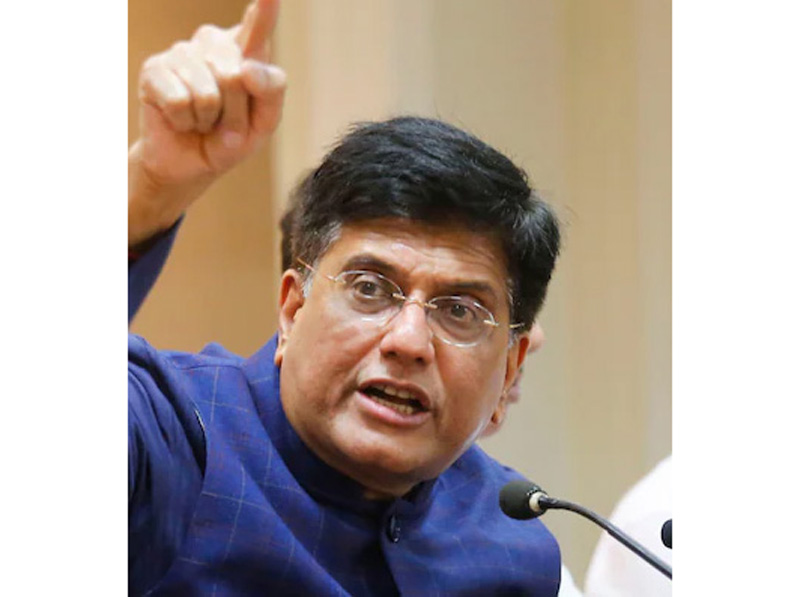NEW DELHI, June 11: Union Minister for Commerce and Industry Piyush Goyal will lead the Indian delegation at the 12th WTO Ministerial Conference which is all set to begin from June 12 in Geneva, Switzerland, officials informed on Saturday.
The conference is being held after a gap of almost five years.
The key areas of discussions and negotiations at this year’s conference include WTO’s response to the pandemic, fisheries subsidies negotiations, agriculture issues including Public Stockholding for Food security, WTO Reforms and Moratorium on Custom Duties on Electronic Transmission, an official statement said on Saturday.
In the agriculture sector, in May 2022, the DG-WTO, brought three draft texts on agriculture, trade and food security and exemption of the World Food Programme from export restrictions for negotiations.
India has reservations about some of the provisions in the draft decisions and has been engaging in the process of discussions and negotiations in order to be able to preserve the rights under the Agreement on Agriculture without undermining the existing Ministerial mandates.
An important issue under negotiation at the WTO relates to protection of India’s food grain procurement programme at Minimum Support Prices (MSP).
Such programmes involve purchase from farmers at administered prices and are key to support to farmers and consumers in the country. WTO rules limit the subsidy that can be provided to such products being procured.
This issue is being negotiated at the WTO by the G-33, coalition of developing countries of which India is a key member, and the African Group which have come together along with the ACP group in submitting a proposal on permanent solution to the issue of public stockholding for food security purposes on 31 May 2022.
In the negotiations, improvements are being sought by developing countries over the Ministerial Decision adopted at the Ninth Ministerial Conference of the WTO in Bali in December 2013 where members agreed to negotiate a permanent solution on the issue of public stockholding for food security purposes by the 11th Ministerial Conference of the WTO.
It was agreed that in the interim, until a permanent solution is reached, members would exercise due restraint (commonly termed as ‘peace clause’) in raising disputes in respect of public stockholding programmes for food security purposes instituted before 7th December 2013, even if countries exceeded their permissible limits.
Consequent to the firm stand taken by India at the WTO, this peace clause was extended by a decision of the WTO General Council (GC) in November 2014 until a permanent solution was agreed and adopted. Thus, it was ensured that the ‘peace clause’ would be available in perpetuity.
At the Nairobi Ministerial Conference held in December 2015, WTO members agreed to engage constructively to negotiate a permanent solution. India neither wants to link PSH issue with other agriculture issues nor a Work Programme as negotiating a permanent solution has a standalone mandate at the WTO.
Other areas of discussion in agriculture are issues relating to market access, special safeguard mechanism for developing countries to protect domestic agricultural producers against import surges and sudden price falls, through additional import duties, on the lines of a similar safeguard presently available to many developed and few developing countries.
India is keen to finalize the fisheries agreement in the upcoming MC-12 because irrational subsidies and overfishing by many countries are hurting Indian fishermen and their livelihood.
WTO members have agreed not to impose customs duties on electronic transmissions since 1998 and the moratorium has been periodically extended at successive ministerial conferences. At MC11, the moratorium was extended for two years.
In the GC meeting held in December, 2019, members agreed to maintain the current practice up to MC 12. At MC12, many WTO members are seeking temporary extension of the moratorium until MC13.
India and South Africa have been making several joint submissions highlighting the adverse impact of the moratorium on developing countries and suggesting that a reconsideration of the moratorium is important for developing countries to preserve policy space for their digital advancement, to regulate imports and to generate revenue through customs duties.
India believes that the reform process and its outcomes should not alter, or in any manner affect, members’ rights and obligations under the WTO Agreements and agreed mandates and that the agreed rules of procedure of the General Council will apply to the review process, the statement added. (UNI)
Trending Now
E-Paper


